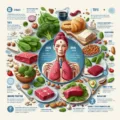Introduction to Vitamin B12
Vitamin B12, also known as cobalamin, is a crucial vitamin that plays a vital role in the production of red blood cells and DNA, as well as in the proper functioning of the nervous system. Despite its importance, many people suffer from Vitamin B12 deficiency, which can lead to a range of health problems, including chronic fatigue. In this article, we’ll explore the signs of Vitamin B12 deficiency, its causes, and how you can ensure you’re getting enough of this essential nutrient.
Signs and Symptoms of Vitamin B12 Deficiency
Vitamin B12 deficiency can manifest in several ways, some of which might surprise you. Here are some common signs and symptoms:
- Chronic fatigue and weakness
- Pale or jaundiced skin
- Shortness of breath and dizziness
- Numbness or tingling in hands and feet
- Difficulty walking or balance problems
- Mood changes, including depression and irritability
- Cognitive impairments, such as memory loss
If you’re experiencing any of these symptoms, it’s essential to consult with a healthcare provider for appropriate testing and diagnosis.
Causes of Vitamin B12 Deficiency
Several factors can contribute to a Vitamin B12 deficiency, including:
- Dietary restrictions: People who follow a vegetarian or vegan diet may be at higher risk, as Vitamin B12 is primarily found in animal products.
- Absorption issues: Conditions like pernicious anemia, celiac disease, and Crohn’s disease can impair the body’s ability to absorb Vitamin B12.
- Age: As we age, our bodies become less efficient at absorbing Vitamin B12 from food.
- Medications: Certain medications, such as proton pump inhibitors and metformin, can interfere with Vitamin B12 absorption.
How to Increase Your Vitamin B12 Intake
Ensuring adequate intake of Vitamin B12 is crucial for maintaining good health. Here are some ways to boost your Vitamin B12 levels:
- Eat B12-rich foods: Incorporate foods like meat, fish, eggs, dairy products, and fortified cereals into your diet.
- Consider supplements: If you’re unable to get enough Vitamin B12 from your diet, talk to your healthcare provider about taking a supplement.
- Injections: For those with severe deficiencies or absorption issues, Vitamin B12 injections may be necessary.
The Role of Vitamin B12 in Energy Production
Vitamin B12 is essential for energy production. It helps convert food into glucose, which your body uses for energy. Without adequate Vitamin B12, you might feel constantly tired and weak. Ensuring you get enough Vitamin B12 can help improve your energy levels and overall well-being.
FAQs about Vitamin B12 Deficiency
1. What foods are high in Vitamin B12?
Animal products like meat, fish, eggs, and dairy are excellent sources of Vitamin B12. Some plant-based foods, such as fortified cereals and nutritional yeast, also contain Vitamin B12.
2. Can you overdose on Vitamin B12?
Vitamin B12 is generally considered safe, even at high doses. The body excretes any excess through urine. However, it’s always best to consult with a healthcare provider before starting any new supplement.
3. How long does it take to recover from a Vitamin B12 deficiency?
Recovery time can vary depending on the severity of the deficiency and the treatment method. Some people may feel better within days of starting treatment, while others might take several months.
4. Can a Vitamin B12 deficiency cause weight gain?
While Vitamin B12 deficiency itself doesn’t directly cause weight gain, the fatigue and weakness associated with it can lead to decreased physical activity, which may contribute to weight gain over time.
5. Is Vitamin B12 deficiency common?
Vitamin B12 deficiency is relatively common, especially among older adults, vegetarians, and vegans. However, it can affect anyone, so it’s essential to be aware of the signs and symptoms and seek medical advice if needed.
Conclusion
Vitamin B12 is vital for maintaining energy levels, cognitive function, and overall health. If you’re feeling constantly tired and weak, a Vitamin B12 deficiency could be the cause. By understanding the signs, causes, and treatment options, you can take steps to ensure you’re getting enough of this crucial nutrient. Remember to consult with a healthcare provider for personalized advice and treatment options.









